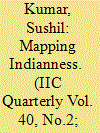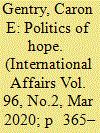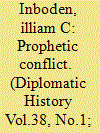| Srl | Item |
| 1 |
ID:
089046


|
|
|
| 2 |
ID:
128556


|
|
|
| 3 |
ID:
171194


|
|
|
|
|
| Summary/Abstract |
Situated within feminist Christian Realism, this article looks at what political theology is and its relevance to International Relations. Hope is a central theme to political theology, underpinning the necessity to be witness to and to work against oppressive structures. Simply put, hope is the desire to make life better. For Christians, this hope stems from a belief in resurrection of Christ and the faith that such redemption is offered to all of humanity. Hope, however, is not limited to Christianity and, therefore, Christian theology. Thus, taking an intersectional approach, the article looks for similarities in how hope is articulated in three personal narratives: theologian Jürgen Moltmann, UK Muslim advocate Asim Qureshi, and Black Lives Matter co-founder Patrisse Khan-Cullors. Across all three personal narratives, the need for hope begins in a place of despair, signalling a need to recognize that hope and privilege are in tension with one another. Feminist Christian Realism acknowledges and embraces this tension, recognizing that hope cannot function if the pain, oppression and harm caused by privilege are erased or minimized.
|
|
|
|
|
|
|
|
|
|
|
|
|
|
|
|
| 4 |
ID:
132008


|
|
|
|
|
| Publication |
2014.
|
| Summary/Abstract |
This article traces the development of Reinhold Niebuhr's growing alarm over the rise of Nazi Germany and Imperial Japan leading up to World War II, and his corresponding warnings to the United States and allied powers of the need to confront fascist aggression. The theme of the "prophetic" shaped Niebuhr's perception of the threat of fascism, both through his concern over the religious liberty of Christian and Jewish voices to bring prophetic judgments against totalitarian governments and through his predictions of the threat that fascist regimes posed to the international order. In the course of the 1930s Niebuhr also refined his doctrine of Christian realism, which both influenced yet differed from the evolution of realism as a theory of international relations. Niebuhr's development over this decade also marked his transition from the margins to the center of American intellectual and political life.
|
|
|
|
|
|
|
|
|
|
|
|
|
|
|
|
| 5 |
ID:
117459


|
|
|
|
|
| Publication |
2012.
|
| Summary/Abstract |
How to theorise religion in International Relations (IR)? Does the concept of post-secularity advance the debate on religion beyond the 'return of religion' and the crisis of secular reason? This article argues that the post-secular remains trapped in the logic of secularism. First, a new account is provided of the 'secularist bias' that characterises mainstream IR theory: (a) defining religion in either essentialist or epiphenomenal terms; (b) positing a series of 'antagonistic binary opposites' such as the secular versus the religious; and (c) de-sacralising and re-sacralising the public square. The article then analyses post-secularity, showing that it subordinates faith under secular reason and sacralises the 'other' by elevating difference into the sole transcendental term. Theorists of the post-secular such as Jürgen Habermas or William Connolly also equate secular modernity with metaphysical universalism, which they seek to replace with post-metaphysical pluralism. In contrast, the alternative that this article outlines is an international theory that develops the Christian realism of the English School in the direction of a metaphysical-political realism. Such a realism binds together reason with faith and envisions a 'corporate' association of peoples and nations beyond the secularist settlement of Westphalia that is centred on national states and transnational markets. By linking immanent values to transcendent principles, this approach can rethink religion in international affairs and help revive grand theory in IR.
|
|
|
|
|
|
|
|
|
|
|
|
|
|
|
|